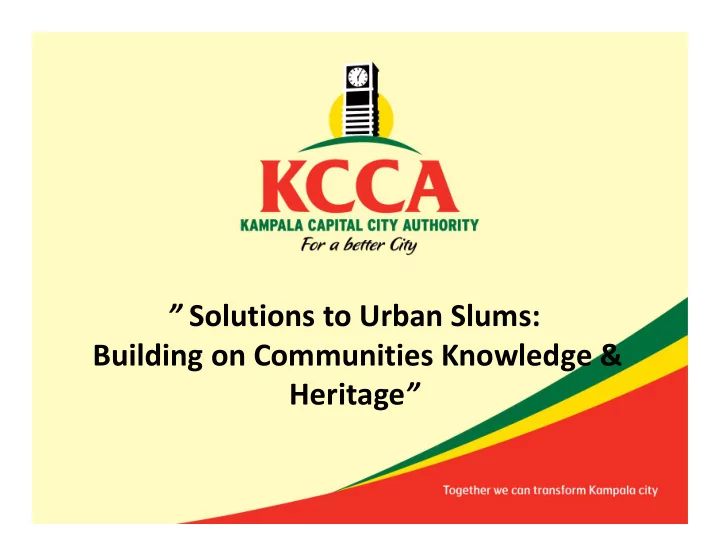

” Solutions to Urban Slums: Building on Communities Knowledge & Heritage ”
Kampala Informal Settlements 2
Historical Perspective and Factors � Colonial plans covered only a small portion of the City. � Presence of privately owned land (Mailo) adjacent to planned areas. � Decades of political strife, bad governance and economic decline soon after independence. � Plans prepared were not enforced as a non- planning culture took root hence a lot of unguided development. 3
Historical Perspective and Factors � Complex Multiplicity of land holding systems in the city with many private landlords � Risk of incoherence and inconsistence in planning decision making as city planning process still ongoing! � So which part of Kampala is a slum? Rather talk of informal settlements. 4
Historical Perspective and Factors Slum or Not? 5
So How Did Kampala ’ s Informal Settlements Come About? • Rapid Urban Population Growth propelled to a great extent by rural-urban migration catalysed by the prospects of a better life (60% GDP) • Vacant/Underutilised land (both public and private) in the vicinity of established employment centres • Insecurity of tenure • Weak development control 6
Current perspective of Kampala ’ s Informal Settlements • 62 informal settlements • 49% to 64% of the total urban population live in slums • estimated population of 560,000 families • 70% temporary buildings • minimum humanitarian standards set for access to water, shelter and sanitation • • Mostly high risk areas to environmental hazards, communicable diseases among others • characterised by high rates/levels of noise, crime, drug abuse, immorality, alcoholism and high HIV/AIDS prevalence.
Spatial Distribution & Popn. Density of Informal Settlements Source: www.actogether.org 8
Kampala ’ s Experience in resolving Informal Settlements Namuwongo • Significant effort at slum eradication in Kampala • the solution did not address the real needs of the population so they sold out and set up along the nearby railway line 9
Kampala ’ s Experience in resolving Informal Settlements � Several players (CBO ’ s & NGOs) continue to assist in this area with specialised areas of expertise/service* � KCCA efforts to date have focussed on critical services: Source: KCCA • Access to clean water • Garbage collection • Health services • Improved roads Source: www.bukedde.co.ug 10
Kampala ’ s Experience in resolving Informal Settlements • Now moving on to a more holistic approach • Partnership with CBO ’ s started to deal with one informal settlement • More collaboration with all stakeholders ongoing 11
Some Constraints to solving slum problems • Land ownership/ tenure insecurity • Financing • Absence of land banks • Political manipulation • Imbalance in Regional Development 12
Proposed Interventions by KCCA??? • Creation of a Slum Upgrading Fund • Developing of an integrated human settlement plan that includes not just houses , but all the ingredients of a community. • Creation of land banks ; • Development and implementation of relocation program for slum improvement. • Promotion of joint ventures in upgrading informal settlements • Identifying areas where urban low cost housing estates can be constructed • Proper Engagement of all stakeholders in the process 13
A GOOD LEARNING OPPORTUNITY FOR KAMPALA! • Listen and share the experiences of those who have better experience in reducing the burden of slums in their towns and cities. • Eager to learn how heritage may inform solutions to the life of the underprivileged in a complex community 14
Addressing the Challenge of Slums • Developing City plans and regulatory mechanisms that are cognisant of the local dynamics of land development; • Developing plans that improve informal and slum settlements and support social housing; • Developing plans to provide basic services and ensure human safety; • Developing of all inclusive city , ensuring urban equity and elimination of spatial exclusion; • Developing of City plans that take into account climate change issues including restoration of forests and wetlands; 15
Tel. +256-794-660-136
Recommend
More recommend